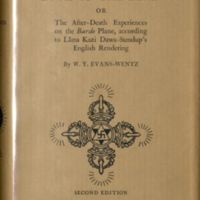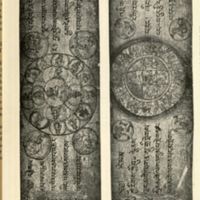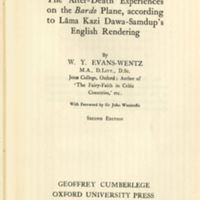The Tibetan Book of the Dead: or, The after-death experiences on the Bardo plane, according to Lāma Kazi Dawa-Samdup's English rendering.
Dublin Core
Title
The Tibetan Book of the Dead: or, The after-death experiences on the Bardo plane, according to Lāma Kazi Dawa-Samdup's English rendering.
Subject
Intermediate state -- Buddhism -- Early works to 1800
Death -- Religious aspects -- Buddhism -- Early works to 1800
Buddhist funeral rites and ceremonies -- China -- Tibet Autonomous Region -- Early works to 1800
Death -- Religious aspects -- Buddhism -- Early works to 1800
Buddhist funeral rites and ceremonies -- China -- Tibet Autonomous Region -- Early works to 1800
Publisher
New York, Oxford University Press
Table Of Contents
The importance of the Bardo Thodol -- The symbolism -- The esotcric significance of the forty-nine days of the Bardo -- The esoteric significance of the five elements -- The wisdom teachings -- The death ceremonies -- The Bardo, or after-death state -- The psychology of the Bardo visions -- The judgment -- The rebirth doctrine -- The cosmography -- The fundamental teachings summarized -- The manuscript -- The origin of the Bardo Thodol -- The translating and the editing -- Book I: the Chikhai Bardo and the Chonyid Bardo -- The transference of the consciousness-principle -- The reading of this Thodol -- The practical application of this Thodol by the officiant -- Part I. the Bardo of the moments of death -- Instructions on the symptoms of death or the first stage of the Chikhai Bardo: the primary clear light seen at the moment of death -- Instructions concerning the second stage of the Chikhai Bardo: the secondary clear light seen immediately after death -- Part II: the Bardo of the experiencing of reality -- Introductory instructions concerning the experiencing of reality during the third stage of the Bardo, called the Chonyid bardo, when the Karmic apparitions appear -- The dawning of the peaceful deities from the first to the seventh day -- the first through seventh day -- The dawning of the wrathful deities from the eight to the fourteenth day -- The eighth to the fourteenth day -- The conclusion, showing the fundamental importance of the Bardo teachings -- Book II: the Sidpa Bardo -- The obeisances -- introductory verses -- part I: the after-death world -- The Bardo body: its birth and its supernormal faculties
Characteristics of existence in the intermediate state -- The judgment -- The all-determining influence of thought -- The dawning of the lights of the six Lokas -- Part II: the process of rebirth -- The closing of the door of the womb -- Method of preventing entry into a womb -- The first through fifth method of closing the womb-door -- The closing of the womb-door -- the premonitory visions of the place rebirth -- The protection against the tormenting furies -- The alternative choosing: supernormal birth; or womb-birth -- Supernatural birth by transference to a paradise realm -- Womb-birth: the return to the human wolrd -- The general conclusion -- The appendix -- The invocation of the Buddahs and Bodhisattvas -- 'The path of good wishes for saving from the dangerous narrow passage-way of the Bardo' -- 'The root verses of the six Bardos' -- 'The path of good wishes which protecteth from fear in the Bardo' -- The colophon -- Addenda -- Yoga -- Tantricism -- Mantras, or words of power -- The Guru and Shishya (or Chela) and Christianity -- The medieval Christian judgment.
Importance of the bardo thodol -- Symbolism -- Esotcric significance of the forty-nine days of the bardo -- Esoteric significance of the five elements -- Wisdom teachings -- Death ceremonies -- Bardo, or after-death state -- Psychology of the bardo visions -- Judgement -- Rebirth doctrine -- Cosmography -- Fundamental teachings summarized -- Manuscript -- Origin of the bardo thodol -- Translating and the editing.
Characteristics of existence in the intermediate state -- The judgment -- The all-determining influence of thought -- The dawning of the lights of the six Lokas -- Part II: the process of rebirth -- The closing of the door of the womb -- Method of preventing entry into a womb -- The first through fifth method of closing the womb-door -- The closing of the womb-door -- the premonitory visions of the place rebirth -- The protection against the tormenting furies -- The alternative choosing: supernormal birth; or womb-birth -- Supernatural birth by transference to a paradise realm -- Womb-birth: the return to the human wolrd -- The general conclusion -- The appendix -- The invocation of the Buddahs and Bodhisattvas -- 'The path of good wishes for saving from the dangerous narrow passage-way of the Bardo' -- 'The root verses of the six Bardos' -- 'The path of good wishes which protecteth from fear in the Bardo' -- The colophon -- Addenda -- Yoga -- Tantricism -- Mantras, or words of power -- The Guru and Shishya (or Chela) and Christianity -- The medieval Christian judgment.
Importance of the bardo thodol -- Symbolism -- Esotcric significance of the forty-nine days of the bardo -- Esoteric significance of the five elements -- Wisdom teachings -- Death ceremonies -- Bardo, or after-death state -- Psychology of the bardo visions -- Judgement -- Rebirth doctrine -- Cosmography -- Fundamental teachings summarized -- Manuscript -- Origin of the bardo thodol -- Translating and the editing.
Text Item Type Metadata
Original Format
Book
Citation
“The Tibetan Book of the Dead: or, The after-death experiences on the Bardo plane, according to Lāma Kazi Dawa-Samdup's English rendering.,” Humanities Hub, accessed February 22, 2026, https://humanitieshub.sdsu.edu/omeka/items/show/795.



